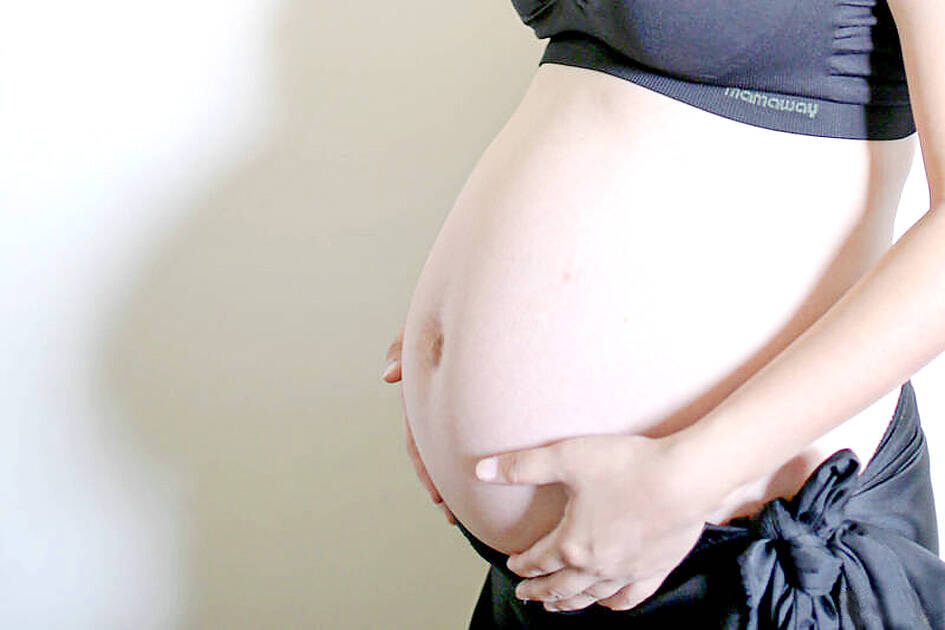Officials are discussing decoupling legal changes related to assisted reproduction from the more controversial issue of surrogacy, the Ministry of Health and Welfare said yesterday, as the government is looking to boost the nation’s flagging birthrate.
The ministry earlier this year announced a draft amendment to the Assisted Reproduction Act (人工生殖法), proposing to legalize assisted reproduction for same-sex couples and unmarried people.
The proposed amendment received much feedback, with significant concerns arising regarding surrogacy, Deputy Minister of Health and Welfare Lin Ching-yi (林靜儀) said in an interview yesterday.

Photo: Taipei Times
Women’s rights and gender advocacy organizations support prioritizing assisted reproduction rights for single women and same-sex female couples first, as these aspects are less controversial.
“Granting access to assisted reproduction technology is a way to support women who cannot find a suitable partner or do not plan to marry a man,” Lin said, adding that the proposed amendment would continue to be discussed.
The current law only permits married heterosexual couples access to assisted reproduction, Taiwanese Society for Reproductive Medicine chairwoman Tsai Ying-mei (蔡英美) said.
“Many women freeze their eggs in their 30s, but they typically wait until about age 40, when married life is more stable, to use them,” Tsai said.
Women’s fertility typically begins to decline after age 30, with ovarian function, egg count and quality, and the likelihood of embryo implantation all decreasing and the risk of pregnancy-related hypertension increasing, Tsai said.
For in vitro fertilization, the success rate is about 44 percent for women aged 35 or younger, 18 percent for women aged 40 or older, and 7.6 percent after age 42, she said.
Married heterosexual couples usually freeze embryos rather than eggs, but as frozen embryos would be destroyed if the couple divorces, some married women still freeze their eggs to hold on to their reproductive autonomy, Tsai said.
On Thursday, National Development Council (NDC) Minister Liu Chin-ching (劉鏡清) told lawmakers that the decline in Taiwan’s birthrate would be difficult to reverse, as is the case in many developed countries.
In his report to the legislature, Liu cited two problems that young Taiwanese face that prevent them from having children: Finding a spouse and caring for their parents.
In Taiwan the vast majority of children are born to married couples (96.25 percent last year), meaning that Taiwanese usually marry before having children, unlike Western societies, he said.
As a result, the government needs to provide greater assistance with childcare, help married couples secure housing earlier or more easily and relieve the burden on young people taking care of their parents, he said.
Over the past 16 years, former presidents Ma Ying-jeou (馬英九) and Tsai Ing-wen (蔡英文) recognized that the population issue was a national security crisis that cannot be solved in a short period, Liu said, responding to lawmakers’ questions about the failure of government policies to boost the birthrate.
The NDC is working to optimize relevant programs, but would require an estimated budget of NT$50 billion (US$1.56 billion) to be effective, he said.
Moreover, for an more comprehensive set of measures, the budget would need to increase to NT$100 billion annually, he added.
However, as there is no fixed budget for NDC programs to increase the birthrate, Liu said he hoped the government would instead draft special budgets.

An essay competition jointly organized by a local writing society and a publisher affiliated with the Chinese Communist Party (CCP) might have contravened the Act Governing Relations Between the People of the Taiwan Area and the Mainland Area (臺灣地區與大陸地區人民關係條例), the Mainland Affairs Council (MAC) said on Thursday. “In this case, the partner organization is clearly an agency under the CCP’s Fujian Provincial Committee,” MAC Deputy Minister and spokesperson Liang Wen-chieh (梁文傑) said at a news briefing in Taipei. “It also involves bringing Taiwanese students to China with all-expenses-paid arrangements to attend award ceremonies and camps,” Liang said. Those two “characteristics” are typically sufficient

A magnitude 5.9 earthquake that struck about 33km off the coast of Hualien City was the "main shock" in a series of quakes in the area, with aftershocks expected over the next three days, the Central Weather Administration (CWA) said yesterday. Prior to the magnitude 5.9 quake shaking most of Taiwan at 6:53pm yesterday, six other earthquakes stronger than a magnitude of 4, starting with a magnitude 5.5 quake at 6:09pm, occurred in the area. CWA Seismological Center Director Wu Chien-fu (吳健富) confirmed that the quakes were all part of the same series and that the magnitude 5.5 temblor was

The brilliant blue waters, thick foliage and bucolic atmosphere on this seemingly idyllic archipelago deep in the Pacific Ocean belie the key role it now plays in a titanic geopolitical struggle. Palau is again on the front line as China, and the US and its allies prepare their forces in an intensifying contest for control over the Asia-Pacific region. The democratic nation of just 17,000 people hosts US-controlled airstrips and soon-to-be-completed radar installations that the US military describes as “critical” to monitoring vast swathes of water and airspace. It is also a key piece of the second island chain, a string of

The Central Weather Administration has issued a heat alert for southeastern Taiwan, warning of temperatures as high as 36°C today, while alerting some coastal areas of strong winds later in the day. Kaohsiung’s Neimen District (內門) and Pingtung County’s Neipu Township (內埔) are under an orange heat alert, which warns of temperatures as high as 36°C for three consecutive days, the CWA said, citing southwest winds. The heat would also extend to Tainan’s Nansi (楠西) and Yujing (玉井) districts, as well as Pingtung’s Gaoshu (高樹), Yanpu (鹽埔) and Majia (瑪家) townships, it said, forecasting highs of up to 36°C in those areas